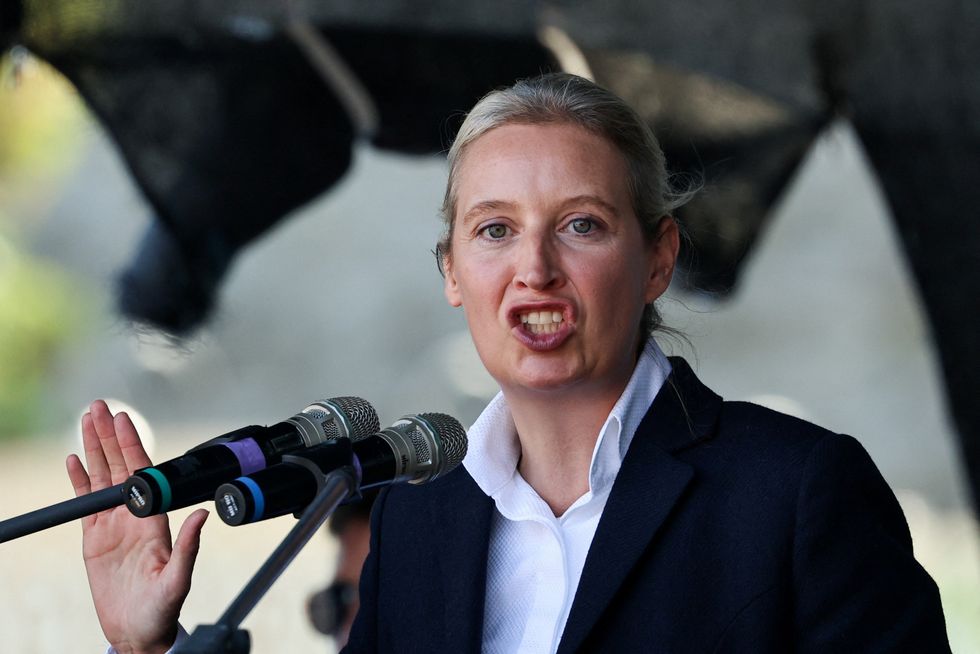Migrant crisis: Germany's AfD pledge 'total closure of borders for 100 days' and mass deportations of immigrants as election draws closer
WATCH: Matt Goodwin defines national populism after the AfD's electoral win in Germany
The party is currently polling at its highest-ever national level of 22 per cent
Don't Miss
Most Read
Trending on GB News
Germany's AfD party has unveiled plans for a complete border shutdown and mass deportations if successful in next month's election.
The party, currently polling at its highest-ever national level of 22 percent, is promising dramatic changes to Germany's immigration policy.
Co-leader Alice Weidel, who was officially confirmed as the AfD's chancellor candidate on Saturday, outlined the party's manifesto at a congress in Riesa - just weeks ahead of the February 23 election.
Despite their strong polling position, the AfD faces significant obstacles to implementing their agenda, as Germany's mainstream parties maintain a longstanding agreement not to work with the party.

Germany's AfD party has unveiled plans for a complete border shutdown and mass deportations if successful in next month's election
Getty
Addressing party supporters, Weidel outlined sweeping measures for the first 100 days of any AfD-led government.
"The total closing of Germany's borders and the turning back anyone travelling without documents" would be implemented alongside 'large-scale repatriations'," she declared.
The co-leader openly embraced the controversial term "remigration" for the party's deportation policy.
"I say to you quite honestly, if this must be called remigration, then let it be called remigration," Weidel told the congress, acknowledging the term's contentious nature.
Critics have compared the policy to ethnic cleansing, though the party maintains it would apply to migrants regardless of their citizenship status.
LATEST DEVELOPMENTS:
The AfD has seen a steady rise in support over its 11-year history, now firmly established as Germany's second most popular party.
Despite this electoral success, the party remains politically isolated due to what German intelligence services label as suspected extremist tendencies.
The party's growing influence was demonstrated in September when it secured a third of the vote in the eastern state of Thuringia.
In current national polling, the conservative CDU/CSU leads with 31 percent, while Chancellor Olaf Scholz's Social Democrats trail at 15 percent.
The AfD's 22 percent support marks its highest-ever showing in national polls.
The political isolation stems from Germany's commitment to preventing far-right influence in government, rooted in the country's Nazi past.
Weidel, who resides in Switzerland, has recently gained international attention through her appearance on Elon Musk's X platform.
The world's richest man hosted the AfD leader for a wide-ranging livestream last week and later shared the party's congress coverage on his account.
Musk's support has drawn criticism for amplifying a party that German intelligence considers a suspected extremist group.

Germany's Alternative for Germany (AfD) party co-leader Alice Weidel said the election could 'bring political change across Germany'
ReutersDer Spiegel magazine has described Weidel, who lives with her Sri Lankan partner and their two sons, as "the perfect fig leaf" for the party.
Before entering politics, Weidel worked at Bank of China and Goldman Sachs, joining the AfD upon its founding in 2013.
Among the AfD's prominent figures is Bjorn Hocke, who was welcomed by supporters at Saturday's congress despite previous controversies.
Hocke had previously called Berlin's Holocaust memorial a "monument of shame" and faced accusations of referencing speeches by Hitler and Nazi propagandist Joseph Goebbels.








